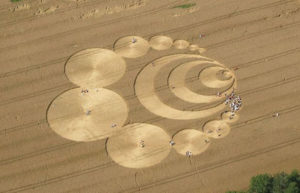Or: You Traveled a Gazillion Miles to Earth & Left Us Some Stones?

My good friend Jeff Mann, the true Yard Ramp Guy, has asked me to revisit some of my original posts. This week in my From the Archives series: I'm not trying to alienate anyone, but...

Whoa.
I'm convinced that there are aliens out there somewhere, but I'm equally convinced they haven't visited us yet.
There was a book called Chariots of the Gods? written by a hack named Erich von Däniken in 1968 that claimed the aliens visited us in ancient times and were responsible for the construction of the pyramids, Stonehenge, the stone heads of Easter Island and others.
The book was extensively rewritten by its final editor, Wilhelm Utermann, who had been a bestselling Nazi author. The book also claimed that the Old Testament, other ancient religious documents, and countless other folktales and legends were also inspired by visits from aliens in ancient times.
The key to the book's claims of aliens constructing various ancient wonders revolved around the idea that the wonders were far too technologically advanced to have been built by ancient peoples. That's just plain wrong. (I wrote about how the pyramids were built—in my first-ever blog post.)
Every single one of von Däniken's claims of that nature can be rebutted fairly easily. Simply put, our ancestors were incredibly smart and innovative.
Unfortunately, von Däniken's ideas are still floating around in the form of that, ahem, television show “Ancient Aliens,” and it still relies on the ridiculous idea that our ancestors couldn't build anything on their own.
For example, crackpot theorists frequently claim that the Nazca Lines are landing instructions for aliens. I’d say the aliens would’ve developed better methods for setting up landing strips. (Not to mention that the terrain around the Nazca Lines would have made terrible landing strips. Landing on or near the lines would have utterly wrecked the delicate constructions.)
Also, if aliens had visited us in ancient times, do you think they could have given us better gifts than big stone monuments? You know, like plumbing, the germ theory of disease, democracy? Even just some nice farming tips?
Yard Ramp Guy Blog: The Safe Yard Ramp Angle
This week, my friend The Yard Ramp Guy answer a potential customer's concern.
Click HERE to read his response.






